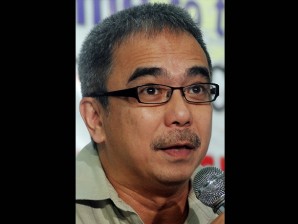The Department of Science and Technology on Tuesday said that the weather bureau had duly observed the short-lived low pressure area (LPA) that struck Metro Manila and neighboring provinces on Sunday night and disseminated information about it.
“I can’t understand how they could say Pagasa (Philippine Atmospheric Geophysical and Astronomical Services Administration) got it wrong,” Science Secretary Mario Montejo said during a briefing at the Pagasa forecasting center in Quezon City.
Montejo said the “Meso cyclone,” or short-lived LPA, was very difficult to observe based on satellite images alone.
Pagasa senior forecaster Jori Loiz said a Doppler radar was more reliable in detecting such phenomenon.
Montejo said Pagasa had issued alerts through Twitter and SMS about the strong rains and winds that Sunday night.
“We used the normal channels … But we will be more proactive. Maybe next time we will be the ones to call the media,” he said in response to a question on whether Pagasa had made any effort to be available to media inquiries that night. DJ Yap
